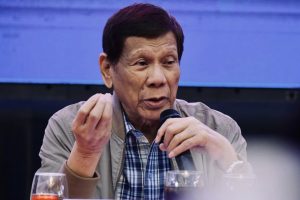While the International Criminal Court (ICC) is investigating the role of former Philippine President Rodrigo Duterte in the bloody enforcement of the “war on drugs,” the House of Representatives has decided to also look into the matter and establish linkages between the drug-related killings and the use of illicit money for these operations.
Duterte repeatedly admitted before the end of his term in 2022 that the anti-drug campaign was a failure since it did not end the drug menace in the country. Duterte won on a platform of fighting criminality and he did this by waging an aggressive campaign against illegal drug operations. He warned that there would be a bloodbath if drug cartels did not surrender. The police who implemented Duterte’s anti-drug program killed at least 6,000 individuals, though human rights groups estimated that the number could reach as high as 30,000.
Police were accused of killing drug suspects and innocent individuals but this did not lead to the suspension of the anti-drug campaign. When human rights groups pressed for justice and accountability, Duterte withdrew the Philippines from the ICC and warned foreign institutions not to interfere in the country’s affairs.
Duterte’s ally, Ferdinand “Bongbong” Marcos Jr, was elected president in 2022 and vowed that the new government would not cooperate with the ICC. But two years later, the alliance between the Duterte and Marcos families ended with Vice President Sara Duterte resigning from her post in the Cabinet as education secretary and her brother calling for Marcos’ resignation as president.
The worsening rift prompted some allies of Marcos in Congress to open a probe into the “war on drugs.” The marathon hearings over the past three months have featured the testimonies of local officials, active and retired police officers, and families of victims of extrajudicial killings, all of whom have confirmed that the anti-drug campaign was rolled out with full support of the president.
Some of the crucial revelations have included the narrative of a former city mayor who claimed that Duterte misused the anti-drug campaign to persecute political rivals. A police officer also testified that money from gambling operations was used to fund the anti-drug campaign. A retired high-ranking police official admitted that the office of the president was distributing financial rewards to police units and officers who achieved successful anti-drug operations.
These testimonies confirmed unofficial reports about the existence of a bounty system for drug-related killings and that Duterte has systematically incentivized the brutal behavior of the police. More importantly, they affirmed the assertion of opposition forces that Duterte used the “war on drugs” to harass his critics and instill fear among the population.
In response, Duterte’s former presidential assistant insisted that “no illegal orders were given, and no reward system existed for police operations.” The Duterte subordinate also dismissed the testimonies presented in Congress as “hearsay and baseless accusations.” Meanwhile, Duterte supporters announced the possibility of the former president testifying in the Senate to answer queries from legislators, but this could be tackled by the legislative body as a whole since two senators were directly involved in carrying out the anti-drug campaign.
The hearings in Congress are not yet finished and it is expected that more damning evidence against Duterte and his trusted police generals will be presented. Congress should act quickly in gathering information since the “window of opportunity” to make Duterte accountable could suddenly close ahead of the midterm elections in May 2025. Duterte is running for mayor in Davao City and his family is consolidating its political base.
The Marcos government should make use of the recent testimonies to probe police officials involved in extrajudicial killings. At the very least, it should assist the ICC in authenticating evidence and reaching out to potential witnesses. If legislators are serious about pursuing justice, they should also consider broadening the scope of their investigations by looking into the extent of political killings under the Duterte presidency.
Amid the maneuver for power among the political elite, the victims of the drug war continue to demand justice. The Congress hearings could be partly motivated by partisan political agenda, but the fight against impunity makes it necessary for various stakeholders to ensure that the process will amplify the call for justice and generate a broader consensus to hold Duterte accountable for the abuses committed under his term.

































